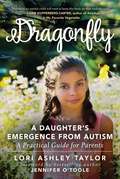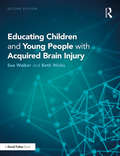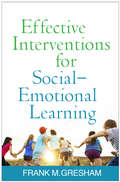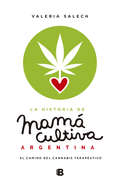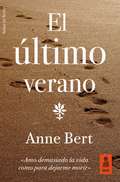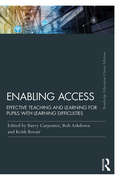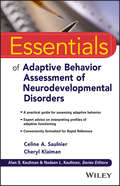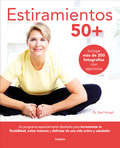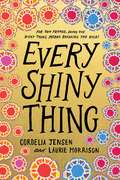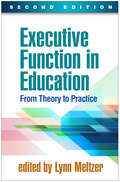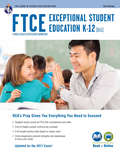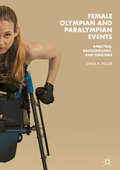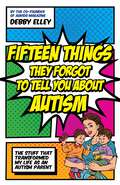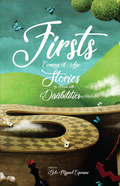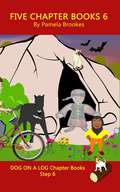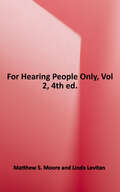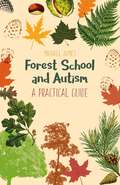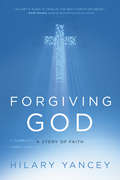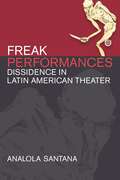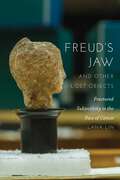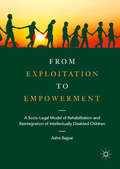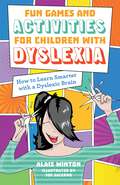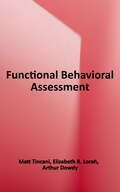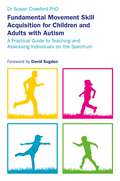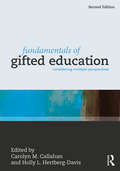- Table View
- List View
Dragonfly: A Daughter's Emergence from Autism: A Practical Guide for Parents
by Tori Ashley Taylor Jennifer O'TooleA parent's guide to helping children with autism maximize their potential. Over a decade ago, an autism diagnosis had confined Lori Ashley Taylor's daughter Hannah to an inaccessible world. Lori became a tireless researcher, worker, and advocate, and her dedication showed results. There can be progression and shifting on the spectrum, and Hannah has done just that—she has emerged. Part narrative and part practical guide, Dragonfly provides anecdotal and practical guidance for parents of children with autism spectrum disorder. The author discusses intervention strategies, therapies such as Applied Behavioral Analysis (ABA), and different medical tests. She explains Autism terminology like hyperresponsivesness and stimming. A classroom teacher herself, she recommends educational accommodations and supports. Busy parents can find practical tips on everything from making friends to Sensory Processing Disorder in helpful sidebars in the text. Taylor's personal experience is supplemented by wisdom from a series of round table discussions featuring other parents of children with autism. In the summer of 2013, eight-year-old Hannah wrote "Life of a Dragonfly," a poem with repeated parallel stanzas that used the stages of a dragonfly's life as a mirror for her own physical and cognitive development. Among its wisdom was: "Hope rises, and I begin to reveal my concealed wings. I begin to understand language and what I am meant to do." Taylor has helped her daughter find her wings; in Dragonfly, she gives other parents the tools to do the same.
Educating Children and Young People with Acquired Brain Injury
by Sue Walker Beth WicksEducating Children with Acquired Brain Injury is an authoritative resource book on the effects of brain injury on young people and how educators can understand and support their needs. This new edition has been updated to reflect changes to legislation and practice relating to special educational needs and will enable you to maximise the learning opportunities for young people with acquired brain injury (ABI). Considering key areas in special educational needs such as communication, interaction, cognition, sensory and physical needs, the book provides information on the multifaceted needs of children and young people with ABI and how these needs can be met. This book will help you to: Understand the difficulties that young people with ABI experience Support these students by using appropriate strategies to help their learning Understand and address the social and emotional difficulties experienced by these students Work in partnership with families and other professionals Understand information from other professionals by reference to a glossary of terms Access further useful information from relevant resources and organisations Written for SENCOs, teachers, teaching assistants, educational psychologists and other education professionals across all settings, Educating Children with Acquired Brain Injury is full of useful information and advice for parents and other family members, clinical and behavioural psychologists, therapists and support workers involved with children and young people with ABI.
Effective Interventions for Social-Emotional Learning
by Frank M. GreshamThis book reviews evidence-based, multi-tiered practices for promoting social-emotional learning (SEL) with typically developing students as well as those with special needs. Leading authority Frank M. Gresham, codeveloper of the Social Skills Improvement System--Rating Scales, describes how to systematically assess K-12 students' social skills and plan and implement universal, selected, and intensive interventions. His approach is grounded in cutting-edge research on social-emotional competencies and their role in adjustment and academic achievement. Emphasizing what works, the book showcases programs and strategies that are sequenced, active, focused, and explicit. Detailed case examples and lesson plans illustrate different levels and types of SEL intervention. Reproducible assessment tools can be downloaded and printed in a convenient 8 1/2" x 11" size.
El libro de Mamá Cultiva Argentina
by Mamá Cultiva ArgentinaUn grupo de madres y pacientes unidos por una problemática común creó la ONG Mamá Cultiva Argentina y convenció a los legisladores de la importancia de acceder a medicamentos producidos en base a extractos de la planta de cannabis para aliviar dolencias crónicas y severas padecidas por numerosos niños, jóvenes, adultos y ancianos de nuestro país. Valeria Salech irradia con naturalidad las virtudes ocultas en el significado de su nombre. De casualidad conocí su valor y valentía en 2017, pocos días antes de la sanción de la Ley 27350 de cannabis medicinal, en una gesta cívica librada por un pequeño colectivo de mujeres que reclamaron y convencieron a legisladores de ambas cámaras de que los prejuicios y la ignorancia solo aseguran más dolor. Para evitar que otras familias transiten por tenebrosos laberintos sin salida, Valeria fundó Mamá Cultiva Argentina, una ONG que logra contener, orientar, integrar y difundir experiencias que afectan a miles de personas en nuestro país. Con la necesidad creciente de compartir sus historias, Valeria recorre los padecimientos, las batallas y las conquistas de familias antes perturbadas por la tristeza, el dolor y la falta de perspectivas luminosas. Este libro cuenta la lucha de Valeria por su hijo Emiliano, quien a poco de nacer manifestó convulsiones frecuentes de alta intensidad, que nunca se detuvieron ante una calesita incesante de neurólogos apurados y fármacos ineficaces. Descartando el "no hay solución" como respuesta, Valeria se aferró a su valor y valentía para indagar en los potenciales beneficios del aceite de cannabis, y desde el primer día descubrió la calma, la sonrisa y la conexión de Emiliano con toda la familia. No fue magia ni fruto de una planta milagrosa: el cannabis posee moléculas capaces de apaciguar impulsos nerviosos mediante la activación de receptores presentes en el cerebro que evitan disparos descontrolados en nuestros circuitos neuronales. La historia de Valeria y de Mamá Cultiva Argentina es un ejemplo de valor y valentía, de aprendizaje y soberanía sanitaria, de la lucha por una salud más inclusiva, humanizada y desprejuiciada.
El último verano
by Anne BertAmaba su existencia con pasión, pero estaba condenada, y Anne Bert decidió elegir no sufrir hasta el final la tortura infligida por la esclerosis lateral amiotrófica. Este es el viaje definitivo de la autora. El que la obligó a morir fuera de la ley, prisionera de sí misma, porque la justicia francesa no autorizó acortar su sufrimiento. Una sugerente invitación a descubrir el sabor de los momentos finales; a aprender a pensar en la muerte; a despedirse de los seres que uno quiere, y a enfrentar el reto de las últimas alegrías a pesar del dolor. Una oda a la libertad y a la vida, solo posible por la determinación de esta escritora a eludir el deterioro final. «A la luz de este último verano que saboreo, tan rodeada y, sin embargo, tan solitaria, estos son los fragmentos de este cara a cara con la mortalidad».
Enabling Access: Effective Teaching and Learning for Pupils with Learning Difficulties
by Barry Carpenter Rob Ashdown Keith BovairThis Routledge Classic Edition brings together widely experienced editors and contributors to show how access to a whole school curriculum can be provided for learners with moderate to profound and multiple learning difficulties. Along with a new appraisal of the contents from the editors, the contributors raise debates, illustrate effective teaching ideas and discuss strategies for providing a high-quality education for these pupils and a celebration of their achievements. The book also discusses the active involvement of family members and the learners themselves in these processes and considers issues surrounding empowerment of learners, professional development of the workforce and curriculum principles such as differentiation, personalisation, and engagement. Winner of the prestigious nasen/TES Academic Book Award in 1996, Enabling Access is an essential read for students and lecturers in higher education, and for teachers, support staff, and other professionals in all educational settings in the UK and abroad catering for these learners.
Essentials of Adaptive Behavior Assessment of Neurodevelopmental Disorders (Essentials of Psychological Assessment)
by Celine A. Saulnier Cheryl KlaimanA practical guide to adaptive behaviors across a range of neurodevelopmental disorders Adaptive behavior assessment measures independent living skills, including communication, social skills, personal care, and practical work skills. For individuals with intellectual disabilities, evaluation of these skills is a critical tool for measuring eligibility and can identify specific skills that must be learned before effective educational interventions can be implemented. Essentials of Adaptive Behavior Assessment of Neurodevelopmental Disorders describes the role of adaptive behavior in assessment and treatment, and provides clear guidance for measurement. Case samples provide real-world illustration of behaviors and assessment, and systematic comparison of various measures are presented and explained to better inform planning. Individual chapters outline specific adaptive behaviors across a range of neurodevelopmental disorders, giving clinicians, practitioners, students, and researchers a better understanding of diagnostic differentials and how to place independent skill programming in treatment and intervention. Plan intervention and treatment based on accessible measurement guidelines across a range of disorders Gain a deeper understanding of adaptive functioning specific to ADHD, autism spectrum disorders, disruptive behavior disorders, and genetic disorders Compare and contrast current measures to evaluate their strengths, weaknesses, and areas of overlap Quickly locate essential information with Rapid Reference and Caution boxes For individuals with neurodevelopmental disorders, adaptive behaviors are the keys to independence; without them, these individuals will perpetually struggle with achieving optimum independence without the basic skills needed to function at home, in school, and in the community. Assessment allows these skills to be factored in to treatment and intervention planning, and can help improve the outcomes of other intervention methods. Essentials of Adaptive Behavior Assessment of Neurodevelopmental Disorders clarifies the assessment of these important behaviors, helping clinicians make more informed decisions around diagnosis, education, and treatment planning.
Estiramientos 50+
by Dr Karl KnopfMejora tu flexibilidad, mejora tu salud. Un libro de ejercicios y rutinas de estiramientos para mantener un cuerpo sano y flexible pasados los 50. En Estiramientos +50 encontrarás más de 90 rutinas fáciles y seguras para mantener un cuerpo sano y flexible, sin importar la edad. Con solo diez minutos al día de práctica en casa, ayudarás a mejorar tu movilidad, sin dolor ni lesiones. Desde los calentamientos y flexiones más idóneos para el cuerpo hasta ejercicios con bandas elásticas, rodillos o fitballs: descubre los trucos clave para no dejar de estar en forma nunca.
Every Shiny Thing
by Cordelia Jensen Laurie MorrisonIn this beautifully constructed middle-grade novel, told half in prose and half in verse, Lauren prides herself on being a good sister, and Sierra is used to taking care of her mom. When Lauren’s parents send her brother to a therapeutic boarding school for teens on the autism spectrum and Sierra moves to a foster home in Lauren’s wealthy neighborhood, both girls are lost until they find a deep bond with each other. But when Lauren recruits Sierra to help with a Robin Hood scheme to raise money for autistic kids who don’t have her family’s resources, Sierra has a lot to lose if the plan goes wrong. Lauren must learn that having good intentions isn’t all that matters when you battle injustice, and Sierra needs to realize that sometimes, the person you need to take care of is yourself.
Executive Function in Education, Second Edition: From Theory to Practice
by Lynn MeltzerThis groundbreaking volume, now revised and updated, has given thousands of educators and clinicians a deeper understanding of executive function (EF) processes in typically developing children and those with learning difficulties and developmental disabilities. The book elucidates how PreK–12 students develop such key capacities as goal setting, organization, cognitive flexibility, working memory, and self-monitoring. Leading experts in education, neuroscience, and psychology explore the links between EF and academic performance and present practical applications for assessment and instruction. Exemplary practices for supporting students with EF difficulties in particular content areas--reading, writing, and math--are reviewed. New to This Edition *Expanded coverage of reading--chapters on recent fMRI research findings; working memory and reading; and self-regulation and reading comprehension. *Chapter on early childhood. *Chapter on embedding EF strategies in the curriculum *Updated throughout with a decade's worth of significant advances in research, theory, and educational best practices. See also Meltzer's authored book Promoting Executive Function in the Classroom, which provides easy-to-implement assessment tools, teaching techniques and activities, and planning aids.
FTCE Exceptional Student Education K-12 (FTCE Teacher Certification Test Prep)
by Nancy Ann Tattner Maryann Gromoll Dr Ken SpringerREA's FTCE Exceptional Student Education K-12 Test Prep with Online Practice TestsGets You Certified and in the Classroom - for 2018-2019 and Beyond!Nationwide, more than 4 million teachers will be needed over the next decade, and all must take appropriate tests to be licensed. REA gets you ready for your teaching career with our outstanding library of Teacher Certification test preps. Fully updated to align with the Sept. 2017 exam changes, REA’s test prep is designed to help teacher candidates master the information on the FTCE Exceptional Student Education K-12 exam and get certified. It's perfect for teacher education students and career-changing professionals who are seeking certification in Florida to teach students with special needs. Written by Florida education experts, our complete study package contains an in-depth review of all the competencies tested on the FTCE Exceptional Student Education K-12 exam, including knowledge of foundations of exceptional student education, knowledge of assessment and evaluation, knowledge of instructional practices in exceptional student education, knowledge of the positive behavioral support process, knowledge of multiple literacies and communication skills, and knowledge of the transition process. . Two full-length online practice exams run under timed-testing conditions and provide automatic scoring and diagnostic feedback on every question to help students zero in on the topics and types of questions that give them trouble now, so they’ll be prepared on test day.The book includes the same two practice tests that are offered online, but without the added benefits of detailed scoring analysis and diagnostic feedback. This complete test prep package comes with a customized study schedule and REA's test-taking strategies and tips.This test prep is a must-have for anyone who wants to teach special needs students in Florida!
Female Olympian and Paralympian Events: Analyses, Backgrounds, and Timelines
by Linda K. FullerFemale Olympian and Paralympian Events is a groundbreaking book that examines women’s sports in the Olympic and Paralympic Games, which have long been underappreciated and under-analyzed. The book begins with a brief background on women’s participation in the Olympic Games and their role relative to the International Olympic Committee, then introduces the underlying Gendered Critical Discourse Analysis theory used throughout the book’s analysis before delving into a literature review of female Olympians and Paralympians’ events. It includes a listing of noteworthy “firsts” in the field, followed by individual discussions of twenty-eight Summer and seven Winter events, analyzed according to their historical, rhetorical, and popular cultural representations. Women’s unique role(s) in the various events are discussed, particular athletes and Paralympic events are highlighted, and original tables are also included. At the end of each section, affiliated organizations and resources are included in this invaluable referential volume.
Fifteen Things They Forgot to Tell You About Autism: The Stuff That Transformed My Life as an Autism Parent
by Debby ElleyWhat if the things people need to know about autism is not the information they're getting? Combining myth-busting advice with personal experience, this book from the mother of autistic twins shares simple strategies to build children's confidence, communication, and independence. From sharing the joy of yodelling around shops at the weekend, to finding creative ways to communicate with both her verbal and her non-verbal sons, Debby Elley gives practical and fun tips for everyday living and shows that being autistic is just another way of being. Both witty and candid, the book discusses labels, meltdowns, acceptance, happiness and much more.
Firsts: Coming of Age Stories by People with Disabilities
by Belo Miguel CiprianiTake a step back in time with some of the best writers with disabilities as they recount their first adventure, their first heartbreak, and the first time the unexpected treaded into their life. From body transformations to societal setbacks, to love affairs and family trauma, Firsts collects the most thought-provoking and exciting stories of our time by people with disabilities. Contributors include Nigel David Kelly, Kimberly Gerry-Tucker, Caitlin Hernandez, Andrew Gurza, and David-Elijah Nahmod.
Five Chapter Books 6: Decodable Books for Phonics Readers and Dyslexia/Dyslexic Learners (DOG ON A LOG Chapter Books #Volume 6)
by Pamela BrookesDecodable Chapter Books for Phonics Readers and folks with a Dyslexic Learning Style. <P><P>This collection is the five books in Step 6 of the DOG ON A LOG Chapter book series. <P><P>The books are: <P><P>The Colt </br> The Gold Bolt </br> Hide In The Blinds </br> The Stone Child </br> Tolt The Kind Cat <P><P>Sight Words: </br> a, are, as, be, come, comes, could, do, does, for, from, go, goes, has, have, he, her, here, his, I, into, is, me, Ms., my, no, of, OK, onto, or, pull, pulls, push, put, puts, said, say, says, see, sees, she, should, so, some, talk, talks, the, their, there, they, to, walk, walks, want, wants, was, we, what, where, would, you, your, yours <P><P>Each book has about 1,390 to 2,000 total words <P><P>These are Step 6 Chapter books. <P><P>The DOG ON A LOG Books series are for phonics readers and folks with a dyslexic learning style. The words used reflect the inclusion of 1 to 3 new phonics rules in each step. There are five books at each step. <P><P>The chapter books are written in a chapter format with one picture in most chapters. They are longer, have more detail, and sometimes offer more complexity than the Let’s GO! Books. They’re great for practicing known and new phonics rules. They’re also just fun reading. <P><P>DOG ON A LOG Let’s GO! Books are shorter versions of DOG ON A LOG Chapter books. Let’s GO! books tell the same stories with about 8 pictures and only a few sentences per page. They’re perfect as an introduction to the new phonics rules or simply for fun reading for younger kids. <P><P>DOG ON A LOG Phonics Progression <P><P>Step 1: Consonants, primary sounds Short vowels Digraphs: ch, sh, th, wh, ck 2 and 3 sound words Possessive ‘s <P><P>Step 2: Bonus letters (f, l, s, z after short vowel) “all” –s suffix <P><P>Step 3: ang, ing, ong, ung, ank, ink, onk, unk <P><P>Step 4: Consonant Blends to make 4 sound words 3 and 4 sound words ending in –lk, -sk <P><P>Step 5: Digraph blends –nch to make 3 and 4 sound words Silent e, including "-ke" <P><P>Step 6: ild, old, olt, ind, ost <P><P>Step 7: 5 sounds in a closed syllable word plus suffix -s (crunch, slumps) 3 letter blends and up to 6 sounds in a closed syllable word (script, spring) <P><P>Step 8: Two syllable words with 2 closed syllables, not blends (sunset, chicken, unfit) <P><P>WATCH FOR MORE STEPS AND BOOKS COMING SOON <P><P>For information on upcoming books see dogonalogbooks.com or visit our Facebook page.
For Hearing People Only
by Matthew S. Moore Linda LevitanThis best-seller answers some of the most common questions about Deaf culture, the Deaf community, and how Deaf people communicate and live. The simple and entertaining question-and-answer format makes this book a good introduction to Deafness and Deaf studies and would make a great gift for hearing friends and associates. Expanded edition.
Forest School and Autism: A Practical Guide
by Michael JamesForest School's innovative outdoor approach offers specific benefits to learners with autism, including increased social skills, raised self-esteem and improved sensory function. This guide raises autism awareness amongst practitioners by providing practical and easy-to-follow advice for adapting Forest School activities for those with autism. For those coming from a mainstream Forest School background, the author offers an introduction to autism and shows what Forest School can offer people with autism - both children and adults - with first-person accounts that highlight its success with this group. The guide gives advice on the social and sensory benefits, offers practical advice on safety and on how to set up a Forest School and finally presents specific activities to be incorporated into practitioners' routines.
Forgiving God: A Story of Faith
by Hilary YanceyA young mother's life is forever changed and her faith in God is broken when her son in diagnosed with complex physical disabilities. Restore and grow your faith as you read about Hilary Yancey's personal journey back to God. Three months into her pregnancy with her first child, Hilary Yancey received a phone call that changed everything. As she learned the diagnosis-cleft lip and palate, a missing right eye, possible breathing complications-Hilary began to pray in earnest. Even in the midst of these findings, she prayed that God would heal her son. God could do a miracle unlike anything she had seen. Only when Hilary held her baby, Jack, in her arms for the first time did she realize God had given her something drastically different than what she had demanded. Hilary struggled to talk to God as she sat for six weeks beside Jack's crib in the NICU. She consented to surgeries and learned to care for a breathing tube and gastronomy button. In her experience with motherhood Hilary had become more familiar with the sound of her son's heart monitor than the sound of his heartbeat. Later, during surgeries and emergency trips back to the hospital with her crying, breathless boy, Hilary reproached the stranger God had become. Jack was different. Hilary was not the mother she once imagined. God was not who Hilary knew before. But she could not let go of one certainty-she could see the image of Christ in Jack's face. Slowly, through long nights of wrestling and longer nights of silence, Hilary cut a path through her old, familiar faith to the God behind it. She discovered that it is by walking out onto the water, where the firm ground gives way, that we can find him. And meeting Jesus, who rises with his scars to proclaim new life, is never what you once imagined.
Freak Performances: Dissidence in Latin American Theater
by Analola SantanaThe figure of the freak as perceived by the Western gaze has always been a part of the Latin American imaginary, from the letters that Columbus wrote about his encounters with dog-faced people to Shakespeare's Caliban. The freak acquires greater significance in a globalized, neoliberal world that defines the "abnormal" as one who does not conform mentally, physically, or emotionally and is unable or unwilling to follow the economic and cultural norms of the institutions in power. Freak Performances examines the continuing effects of colonialism on modern Latin American identities, with a particular focus on the way it has constructed the body of the other through performance. Theater questions the representations of these bodies, as it enables the empowerment of the silenced other; the freak as a spectacle of otherness finds in performance an opportunity for re-appropriation by artists resisting the dominant authority. Through an analysis of experimental theater, dance theater, performance art, and gallery-based installation art across eight countries, Analola Santana explores the theoretical issues shaped by the encounters and negotiations between different bodies in the current Latin American landscape.
Freud's Jaw and Other Lost Objects: Fractured Subjectivity in the Face of Cancer
by Lana LinWhat does it mean to live with life-threatening illness? How does one respond to loss? Freud’s Jaw and Other Lost Objects attempts to answer these questions and, as such, illuminates the vulnerabilities of the human body and how human beings suffer harm. In particular, it examines how cancer disrupts feelings of bodily integrity and agency. Employing psychoanalytic theory and literary analysis, Lana Lin tracks three exemplary figures, psychoanalyst Sigmund Freud, poet Audre Lorde, and literary and queer theorist Eve Kosofsky Sedgwick. Freud’s sixteen-year ordeal with a prosthetic jaw, the result of oral cancer, demonstrates the powers and failures of prosthetic objects in warding off physical and psychic fragmentation. Lorde’s life writing reveals how losing a breast to cancer is experienced as yet another attack directed toward her racially and sexually vilified body. Sedgwick’s memoir and breast cancer advice column negotiate her morbidity by disseminating a public discourse of love and pedagogy. Lin concludes with an analysis of reparative efforts at the rival Freud Museums in London and Vienna. The disassembled Freudian archive, like the subjectivities-in-dissolution upon which the book focuses, shows how the labor of integration is tethered to persistent discontinuities.Freud’s Jaw asks what are the psychic effects of surviving in proximity to one’s mortality, and it suggests that violences stemming from social, cultural, and biological environments condition the burden of such injury. Drawing on psychoanalyst Melanie Klein’s concept of “reparation,” wherein constructive forces are harnessed to repair damage to internal psychic objects, Lin proposes that the prospect of imminent destruction paradoxically incites creativity. The afflicted are obliged to devise means to reinstate, at least temporarily, their destabilized physical and psychic unity through creative, reparative projects of love and writing.
From Exploitation to Empowerment: A Socio-Legal Model of Rehabilitation and Reintegration of Intellectually Disabled Children
by Asha BajpaiThis book presents the outcomes of a field action project at the Tata Institute of Social Sciences (TISS). Project Chunauti (English translation: Project Challenge) focused on a group of intellectually disabled, orphan children who were survivors of abuse, exploitation and neglect, and describes their journey toward empowerment. It offers a vision and a reproducible, adaptable model for rehabilitation that can foster the social re-integration of intellectually disabled orphans at institutions. As the implementation of laws is especially important for vulnerable groups, the book also outlines a socio-legal approach that not only impacts the children directly, but can also bring about policy level reforms.Project Chunauti was born out of the need to explore options for these children and to set standards for their care, protection, rehabilitation and social re-integration. The core objectives of the project were to provide support and services, including counseling, education, life skills and vocational skills training, as well as medical and psychiatric support to help them overcome the trauma of abuse and exploitation. Its further goal was to train the staff of state-run homes and state authorities, helping them prepare and implement care plans and rehabilitation, combat child sexual abuse and malnutrition, employ positive disciplining, and better understand disabilities. The book also draws on the Project team’s experiences of rolling out the replication process in Maharashtra. This book highlights the role of the courts, media and other stakeholders in the journey towards empowerment and justice. It is a combination of social-work methods, application and implementation of law and legal advocacy, as well as best practices for protecting children’s rights and developing rehabilitation and re-integration projects for intellectually disabled, orphaned children in India. The interventions detailed here provide a reproducible, adaptable model of intervention for children in institutional care across the country.
Fun Games and Activities for Children with Dyslexia: How to Learn Smarter with a Dyslexic Brain
by Alais Winton Joe SalernoDyslexic learner and teacher Alais Winton shows the positives of being dyslexic, and makes learning (and even spelling!) fun, with games and activities to make school learning simple. An inventive and practical book for children aged 7 to 13 who have been identified as having dyslexic tendencies, this book contains practical and creative activities for kids and teens to use, such as Spelling Sculptures and Hear it, Sing it, Beat it! The games and activities use the four different learning styles that work best with dyslexics - thinking in pictures, in movement, in music or socially. With funny cartoons, which appeal to visual thinkers, and a section with advice on how parents and guardians can aid learning, this is an essential toolkit for any dyslexic child.
Functional Behavioral Assessment
by Matt Tincani Elizabeth R. Lorah Arthur DowdyDescribes how to conduct functional behavioral assessment (FBA) as an information-gathering process to develop successful function-based intervention plans for children and youth with autism spectrum disorder (ASD)
Fundamental Movement Skill Acquisition for Children and Adults with Autism: A Practical Guide to Teaching and Assessing Individuals on the Spectrum
by Susan Crawford David SugdenThis innovative manual sets out advice on fundamental movement skill acquisition (FMS) and its benefits for improving physical, verbal and social skills for people with Autistic Spectrum Disorder (ASD). Improving FMS can help prevent long term health issues, and increase opportunities for social engagement and independence. The book explores the basic skills of movement (running, catching, throwing, and balance) and how to observe, teach and assess FMS in children and adults with ASD. There are sections on how to develop and implement a programme for individuals to guide their personal development, and information on planning and tools for assessment are included. A much needed guide on how to combat impairment of FMS, the book also highlights the numerous benefits of such an approach in relation to behaviour, lifestyle, health and education.
Fundamentals of Gifted Education: Considering Multiple Perspectives
by Carolyn M. Callahan Holly L. Hertberg-DavisThe field of gifted education is characterized by a perplexing array of perspectives concerning such fundamental issues as definition, identification, curriculum, social and emotional development, and underserved populations. Fundamentals of Gifted Education provides a coherent framework for planning effective programs, providing appropriate educational services, and evaluating programs for the gifted. Parts are organized around fundamental issues confronting the field and follow a common structure: an introductory chapter that provides an overview of the theme of that part as well as guiding points and questions for the reader followed by representative point-of-view chapters written by leading experts that provide varied perspectives on the topic at hand.
